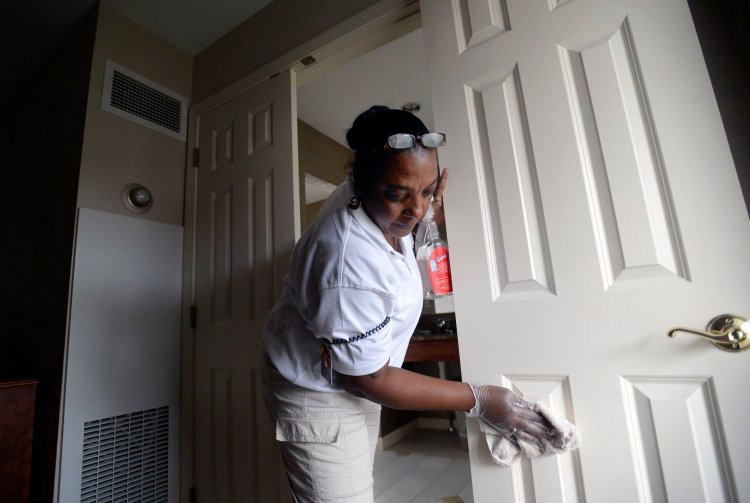Maine’s congressional delegation is leaning on the Trump administration to allow more temporary foreign workers into the country as the state’s labor-starved tourism industry prepares for another busy summer.
Maine hotels, restaurants and landscaping companies have relied on the federal H-2B visa program to hire workers from other countries to reinforce their seasonal workforce for decades.
The program authorizes work visas, often in low-wage positions, for up to nine months to staff full-time jobs businesses cannot fill with U.S. residents.
But national labor demand vastly exceeds the number of visas available. Federal law allocates 66,000 visas nationally, split evenly in two halves of the year for jobs in hospitality, landscaping, forestry, construction and food processing.
Congressional delegates from Maine and states across the country have waged an annual bipartisan fight with the Trump administration to temporarily increase the visa cap since at least 2017.
“This is a national problem that costs American jobs,” said independent Sen. Angus King of Maine in an interview. In years past, visa workers have made up a fraction of seasonal workers, but they help support seasonal businesses.
“We can’t seem to get the administration to a more responsible position on this issue,” King said.
Since Jan. 2, seasonal businesses across the country have applied for U.S. Department of Labor certification acknowledging that they require a visa worker. Within a week over 99,300 positions were requested for the spring and summer – three times the number of visas available.
“There are tons of other people who missed the deadline, or didn’t know when to file or just gave up because they had no success with the program,” said Greg Dugal, director of government affairs at trade association HospitalityMaine.
Employers also were entered this year into a labor certification lottery. In previous years, applications came in on a rolling deadline based on a worker’s start date, and were doled out until the cap was reached, Dugal said.
Even Maine businesses that employed H-2B visa workers for 10 years or more were sorted to the bottom of the pile when they applied this year, Dugal said.
“You’ve taken something that if you were efficient and filed at the appropriate time, and dotted your ‘I’s and crossed your ‘T’s you had a very good shot of getting your employees,” Dugal said.
“This year, it makes no difference what you do, everyone goes into the pot and they pick you out – it’s like going to Las Vegas.”
Unwelcome changes to the system are nothing new – the H-2B program is notoriously unpredictable.
Businesses deal with the costly headache of hiring lawyers and finding transportation and housing for foreign workers because they can’t hire enough workers locally, said Tony DeLois, co-owner of Uncommon Hospitality, a hotel company that owns properties in Portland and Ogunquit.
The York County beach town simply doesn’t have enough workers to fill the ranks of the dozens of hotels and restaurants that cater to crowds of tourists every summer, DeLois said.
“Bringing in a workforce that can help out in peak season is instrumental to every single business that operates in Ogunquit,” he said. The problem extends to the New England hospitality industry generally.
“Everyone has a staffing problem, it doesn’t matter what the season,” added DeLois, who sits on the board of New England Inns and Resorts Association trade group.
Maine’s summer hospitality industry has complained about seasonal labor shortages for years. Travel to the state has grown by an average of 3 percent annually since 2014, to 37 million visitors last year, and tourists have started coming earlier in the spring and staying later in the fall.
But with a historically low 2.9 percent unemployment rate and employers hiring for year-round jobs, some businesses have had to reduce hours, close blocks of rooms and otherwise cut back services.
That makes the need for foreign workers even more pressing. Employers have to go through an expensive vetting process, prove they cannot hire U.S. workers into the jobs they need and pay a H-2B workers federally mandated wage that applies to all other employees in the same job.
“The program does not keep wages low, the prevailing wage is often dollars above the minimum wage in the area,” DeLois said.
The U.S. Department of Homeland Security is authorized by the most recent federal funding bill to add up to 64,716 more H-2B visas this year, but so far it has not added any.
Maine’s entire congressional delegation, including King, Republican Sen. Susan Collins and Democratic Reps. Chellie Pingree and Jared Golden, along with 185 other U.S. lawmakers, signed a letter asking Acting Homeland Security Secretary Chad Wolf to release more visas.
“Without immediate and meaningful H-2B cap relief, seasonal businesses will be forced to scale back operations, cancel or default on contracts, lay off full-time U.S. workers and, in some cases, close operations completely,” the lawmakers said in the letter.
Homeland Security has previously approved visa increases, raising the cap by 15,000 in 2017 and 2018, and by 30,000 last year. Businesses have to prove they will suffer “irreparable harm” if they cannot hire enough visa workers.
Those past increases weren’t enough to satisfy demand, and some visa workers didn’t arrive until well into peak season, which “caused significant harm to the seasonal industry,” the lawmakers said.
Send questions/comments to the editors.




Comments are no longer available on this story